Latest in Politics
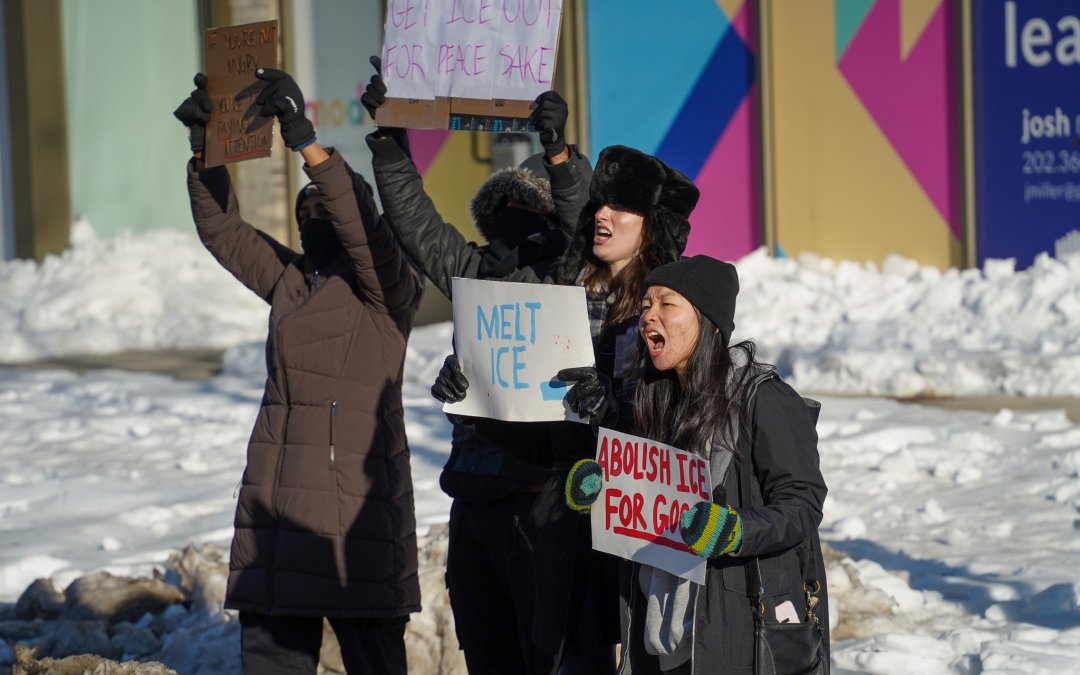
In Photos: ‘ICE Out For Good’ protesters gather in freezing temperatures
Protesters gathered at the intersection of Georgia Ave-Petworth to speak out against ICE activity in the U.S.
read moreIn Photos: From Dancing to a Free Round Trip, US Mayors Deepen Ties With Singapore and each other
WASHINGTON — The U.S. Conference of Mayors held an event at the Singaporean embassy on Thursday night where mayors mingled in tents and viewed exhibits and performances showcasing Singapore’s culture and governance.
There were costumed performances, traditional food and a round‑trip ticket giveaway to Singapore for one lucky Mayor.
Jeffries emphasizes need for changes at ICE ahead of possible government
WASHINGTON — House Minority Leader Hakeem Jeffries, D-N.Y., called for immediate and dramatic changes at U.S. Immigration and Customs Enforcement in a press conference Thursday.
Jeffries’s comments come as the Senate works to avert a partial government shutdown. If a deal is not reached, the partial shutdown would start at 12:01a.m. on Saturday.
A minibus spending package containing six bills passed the House last week. Democrats are pushing for the bill funding the Department of Homeland Security, which oversees ICE, to be separated from the five other appropriations bills. Any changes senators make to the bill would need to go back to the House, which is currently out of session this week, for a vote.
Jeffries said an overhaul must be made at DHS before any appropriations bills regarding the department or ICE proceed.
“Dramatic changes need to occur as it relates to the way in which DHS agents generally, and ICE specifically, have been conducting themselves,” Jeffries said. “Taxpayer dollars should not be used to brutalize American citizens, to kill the American people or to violently target law-abiding immigrant families.”
House Democrats support the Senate passing the other bills in the minibus and the president signing them into law, Jeffries said.
“The failure to do so will simply be another indication that Republicans, once again, want to shut the government down in order to try to jam their extreme right-wing policies down the throats of the American people,” Jeffries said.
He added that if the Senate comes to a deal, House Democrats will need to evaluate it “in its totality.”
Jeffries also said there should be independent investigations when DHS officials commit crimes. State and local authorities should have the ability to conduct an independent investigation into crimes committed by DHS agents, he said.
Jeffries added that there should be a ban on the deportations of American citizens.
“We should have an explicit prohibition that DHS cannot detain or deport American citizens. Period. Full stop. The American people support it,” Jeffries said.
Jeffries also called for the firing of Department of Homeland Security Secretary Kristi Noem. He said that impeachment charges would follow if she were not fired.
“She needs to be put on ice permanently,” said Jeffries about Noem. “She’s got to go.”
In addition to Noem, Jeffries said that Homeland Security Advisor Stephen Miller should be removed. He added that Miller is a “malignant, unelected interloper” and was “the architect” of President Donald Trump’s “toxic immigration policies.”
“So when we evaluate the administration’s intentions, we’re not interested in a change in tone,” said Jeffries. “We’re interested in a change in behavior on the ground in American communities across the country, and as it relates to the people who are around Donald Trump.”
Latest in Education
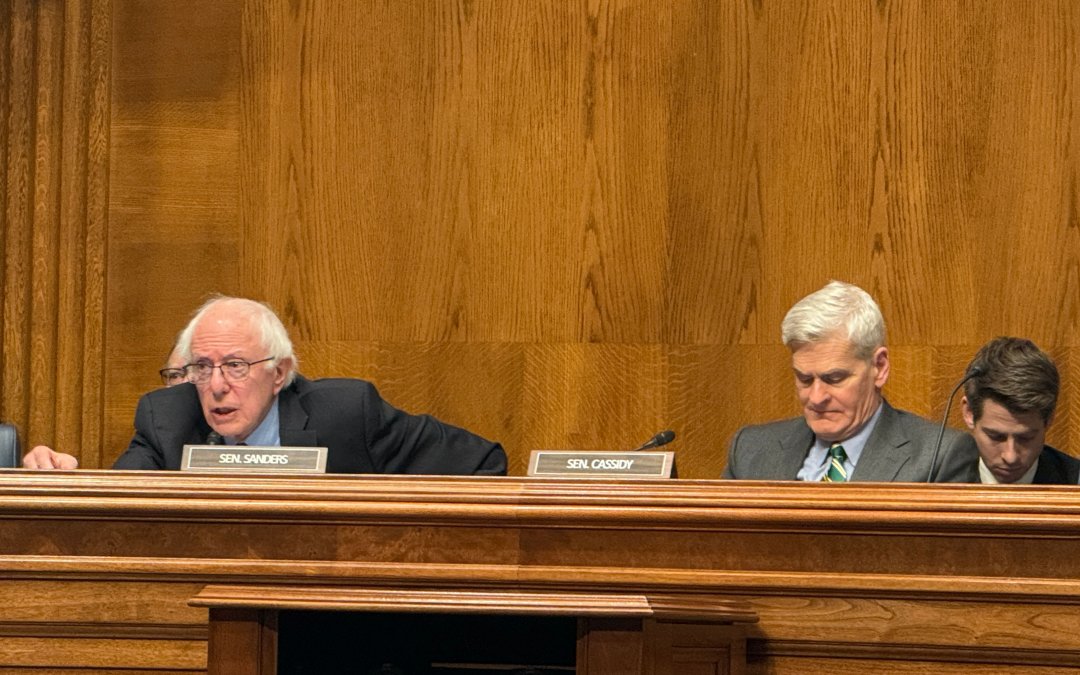
Repubs, Dems divided over school choice solution amid struggling education system
Senators debated policies that allow public education funds to follow students to schools of their choice during a Committee on Health, Education, Labor and Pensions hearing Wednesday.
read moreSenators are unanimous on the need to protect children from social media, AI
WASHINGTON – Republican and Democratic Senators on Thursday expressed similar concerns over the harmful effects of social media and AI on children, highlighting the need to address the “societal emergency” through federal regulations at a Senate Commerce, Science and Transportation Committee hearing.
“It’s incredibly hard to be a kid right now,” committee Chairman Sen. Ted Cruz, R-Tex., said. “All of the parents I know, myself included, are deeply concerned about all the time kids spend glued to screens watching and reading insidious content that puts their minds and their bodies at risk.”
Senators’ discussion Thursday centered around regulating algorithmic targeting, AI, data collection and technology use in schools.
The hearing came as parents, pediatricians and politicians struggle to respond to a youth mental health crisis driven at least in part by social media. AI advancements continue to amplify safety concerns, particularly for children. Cruz said a step towards addressing the problem would be for the Congress to adopt the Kids Off Social Media Act, which passed the committee last February but has not yet been put on the Senate calendar.
The Kids Off Social Media Act would set a minimum age to use social media platforms at 13 and prevent social media companies from using algorithms to feed addictive content to users under 17.
“I think the headline about KOSMA is the 13 year old threshold,” Sen. Brian Schatz, D-Hawaii, said. “Arguably, the more powerful aspect of KOSMA is the banning of the algorithmic feed for kids who are permitted to be on social between 13 and 18.”
The bill also aims to limit the use of social media in schools by blocking social media and other harmful content on federally funded school networks and devices.
Under the Kids Off Social Media Act, schools that receive discounted telecommunications service under the Schools and Libraries Universal Service Support (E-rate) program must reimburse the federal government if they violate the bill.
Some Democrats said they oppose this aspect of the bill.
“Congress is obligated to act, but rather than focusing on threatening E-rate connectivity for schools, I think we should be passing meaningful protections for kids’ online privacy regardless of whether they are accessing the internet from home or school,” said Sen. Maria Cantwell, D-Wash., the top Democrat on the panel.
Cantwell pointed to other draft legislation, including the Kids Online Safety Act, Children and Teens’ Online Privacy Protection Act, American Privacy Rights Act and her own Future of Artificial Intelligence Innovation Act, which she said would “regulate AI in a better way.”
Cruz criticized the Democrats and the Federal Communications Commission under Biden, saying they “sought to bankroll kids’ unsupervised internet access” and “undermine parental rights by expanding the E-rate program to install wifi hotspots off campus, including in school buses and student homes.”
The E-rate program funds much more than just “online distractions,” including connectivity, cybersecurity, teacher professional development and vocational programs, said witness, Dr. Jenny Radesky, a developmental pediatrician and professor at the University of Michigan Medical School.
“I think it is too blunt of a response to a problem that I think could be more effectively addressed through pressure on the tech companies that are doing the filtering,” Radesky said.
Sen. Dan Sullivan, R-Alaska, and Sen. Ben Ray Luján,D-N.M., said they want to hold big tech companies accountable. Luján said he hopes the committee will use its subpoena power to force tech executives to testify in future hearings.
“If we’re concerned about kids, then put their asses in those chairs and have them answer questions and face the families,” Luján said. “When are they going to fix the damaging behavior of just lining their pockets with dollars at the expense of the health of kids all across America?”
Cruz said Luján was “preaching to the choir” and that KOSMA would hold big tech accountable to their terms of service.
Watch: As anti-transgender bathroom policies fall flat in Va. election, challenges remain for LGBTQ students
ARLINGTON, Va. — Several school districts in Northern Virginia have pushed back against the federal government after the Trump administration claimed they violated Title IX by allowing transgender and nonbinary students to access locker rooms and bathrooms aligned with their gender identity.
During the gubernatorial election in November, GOP candidate Winsome Earle-Sears campaigned against expanding access for transgender students, but voters indicated this issue was not top of mind for them.
“The election results really showed that the reverse is true,” Temple University law professor Dara Purvis said. “The majority of Virginians don’t care because they don’t see inclusion of trans children as a problem.”
Even so, Purvis says transgender youth and their families still face many challenges at school.
“There is voluminous evidence that facing hostility, and being excluded from spaces, being denied recognition of your gender has extremely negative emotional and mental effects,” she said.
Watch the video report here:
Health & Science

Prescription drugs lack country-of-origin labels. Senators object.
The FDA allows drug manufacturers to keep confidential information about where prescription drugs and their ingredients are produced.
read moreThe Doomsday Clock moves closer to apocalypse than ever
WASHINGTON – The Bulletin of the Atomic Scientists moved the Doomsday clock to 85 seconds to midnight on Tuesday, the shortest the metaphorical countdown to apocalypse has ever been in the clock’s 79-year-long history.
The science-oriented advocacy group emphasized the threats of artificial intelligence, climate change and nuclear war. The Bulletin’s Science and Security Board said the global rise of nationalistic autocracies and the erosion of democratic institutions increased the risk of global issues. These political shifts, combined with rapid developments in the biotechnological threats, have significantly increased the probability of a man-made catastrophe.
“Every second counts. And we are running out of time,” said Bulletin President and CEO Alexandra Bell.
The combined threats present such a substantial risk to humanity that the people of the world should call on their leaders to fight these global challenges, according to the group of scientists and other experts.
NUCLEAR THREAT
The Bulletin specifically criticized the United States, Russia and China for expanding and modernizing their nuclear arsenals while favoring “grandiosity and competition over diplomacy and cooperation” in international relations.
For example, deploying weapons in space, such as President Trump’s proposed “Golden Dome” missile defense system, could trigger a competition with other great powers and increase the risk of a space-based war, said Steve Fetter, a member of the Science and Security Board.
Another reason the clock moved closer to midnight was that the leaders of nuclear-armed states have recently threatened to use nuclear weapons on the battlefield, said Jon B. Wolfsthal, a member of the Science and Security Board. Wolfsthal noted that Russia and Pakistan had both made such threats recently.
Previously nuclear weapons played a role in deter warfare and force adversaries to negotiate, he said.
This shift to actively threatening to use nuclear weapons came as the last remaining nuclear arms control agreement between the U.S. and Russia, the New Strategic Arms Reduction Treaty (New START), was set to expire next week.
“So for the first time in generations, both of these countries will be free to deploy as many nuclear weapons as they want or believe they need,” warned Wolfsthal.
BIOTECHNOLOGICAL THREAT
Another biological threat that the Bulletin said could pose a radical departure from life as we know it in the future would be the development of mirror-image life, synthetic organisms made from molecules that are the reverse version of those used in nature. According to the Bulletin, a self-replicating mirror cell could plausibly spread throughout all ecosystems and eventually cause the widespread death of humans, other animals, and plants. Yet, experts said scientists would not have the capability to create mirror life for at least another decade.
Despite the risk, researchers in some countries continue to compete to develop mirror life, said Asha M. George, executive director of the Bipartisan Commission on Biodefense.
George said biotechnology is advancing so rapidly that the international community has failed to designate which experiments are too risky to perform.
She also warned that non-state actors continue to seek biological agents for use in terrorism, such as ricin, a toxic chemical made from castor seeds.
“We keep seeing these incidents all over the place. We have ricin incidents occurring here in the United States pretty frequently,” said George.
THREAT OF ARTIFICIAL INTELLIGENCE
According to the Bulletin, the evolution of AI also poses threats across multiple sectors. Biological risks now include people using AI to design new pathogens for which humans have no effective defenses. The United States, Russia and China are incorporating AI across their defense sectors, despite the potential dangers of such moves.
The Bulletin specifically criticized the Trump administration for revoking a previous executive order on AI safety. The board stated the move reflects a “dangerous prioritization of innovation over safety.”
The board also warned that AI “hallucinations” can generate misinformation and undermine the fact-based public discourse required to address global threats.
“We are living through an information Armageddon that’s brought by the technology that rules our lives,” said Maria Ressa, Cofounder and CEO of Rappler and 2021 Nobel Peace Prize Laureate. “Without facts, you can’t have truth. Without truth, you can’t have trust. Without these three, we have no shared reality. We can’t have journalism. We can’t have democracy, the radical collaboration this moment demands becomes impossible.”
CALL TO ACTION
By moving the clock forward, the Bulletin hoped to encourage experts and average people to exert pressure on leaders and governments “to do the right thing,” John Mecklin, the Bulletin’s editor-in-chief, said in an interview
“National leaders—particularly those in the United States, Russia, and China—must take the lead in finding a path away from the brink. Citizens must insist they do so,” the group’s statement said.
For example, grassroots movements and private sector pressure in the past have demanded government action to switch to cleaner renewable energy, which is now more economical and convenient than fossil fuels, said Ines Fung, Bulletin Science and Security Board member.
In closing, members of the Science and Security Board urged the public around the globe to ensure that government action is sufficient to counter the existential threats facing society.
“The destruction has happened. We’re standing on the rubble of the world that was. Now it’s time to create, to build the world we want that is more compassionate, more equal, more sustainable,” said Ressa.
Lawmakers question health insurance CEOs on rising costs
WASHINGTON — House lawmakers grilled five health insurance CEOs at a hearing Thursday, with Republicans and Democrats agreeing that U.S. health care costs are rising, particularly after the expiration of COVID-era tax credits.
The CEOs hailed from UnitedHealth Group, CVS Health, Elevance Health, Cigna Group and Ascendium, among the nation’s largest health insurance companies.
Ascendium CEO Paul Markovich and UnitedHealth Group CEO Stephen Hemsley broke with their peers, arguing that higher input costs, not insurer behavior, are driving price increases. When asked if his firm is actually doing enough to lower prices for consumers, Markovich said, “No, because it just costs too much.”
“The cost of health care insurance fundamentally reflects the cost of health care itself,” Hemsley said. “It is more an effect than a cause.”
Lawmakers pushed back, citing vertical integration, which is when a single company controls multiple parts of the health care supply chain. Rep. Greg Murphy, R-MD., called the practice “disastrous and criminal.”
“I don’t want to hear about the fact you’re not taking profits,” Rep. Murphy said. “We know how money gets moved around in these companies. The C-suite executive salary compensation is a slap in the face to the average American who goes bankrupt because they cannot afford health care.”
Rep. Gwen Moore, D-Wis., pressed the executives on their multimillion-dollar pay.
“I’m wondering if you support the notion of, say, a public option where we’d have some bureaucrat making, say, $250,000 a year, 1% of the $25 million you guys make,” Rep. Moore said.
All five CEOs said they support Trump-backed transparency reforms aimed at cracking down on fraudulent enrollments and holding insurers accountable for coverage denials. Still, the committee chairman rebuked them.
“Its a shame it’s taken a congressional testimony for you all to put patients over profits,” Rep. Jason Smith, R-Mo.
Despite bipartisan agreement that costs are rising, lawmakers split sharply over the cause. Democrats argued that prices have climbed since Republicans, at President Trump’s urging, allowed federal health care subsidies to expire.
“A theme of this Congress has been Republican silence,” said Rep. Richard Neal, D-Mass. “As our colleagues on the other side rubber-stamp everything that the president says and does.”
Republicans blamed health care costs on the Affordable Care Act, enacted under President Barack Obama in 2010.
“After 15 years of a Democrat-created health system under Obamacare, prices have only gone up, not down,” said Rep. Smith. “To be fair, blame can also be directed at federal mandates, draconian pricing rules and open-ended subsidies intended to expand coverage and make it more affordable. Over time, these policies in many cases have had the complete opposite effect.”
In its written testimony submitted ahead of the hearing, UnitedHealth said it will provide rebates to customers enrolled in Affordable Care Act plans in 2026.
Latest in Environment

Wildfire bill sparks partisan clash at House hearing
Debate over the Fix Our Forests Act featured limited discussion of the bill itself as Democrats focused on broader criticisms of the Trump administration.
read moreIs climate change a losing message for Democrats?
WASHINGTON — With the United States withdrawing from the Paris Agreement and environmental regulations being dismantled under the Trump administration, Democrats are reexamining whether climate change still resonates in American politics.
Earlier this week, the United States officially withdrew from the Paris Agreement, a global treaty adopted in 2015 to combat climate change. That followed major environmental rollbacks, including the Environmental Protection Agency’s decision to ignore health costs in air pollution considerations, and the Trump administration’s dismantling of climate research facilities.
Despite President Donald Trump’s aggressive efforts to roll back climate change action, some Democrats seemed reluctant to use the issue to appeal to voters, which dismayed some of the party’s strongest climate advocates.
Sen. Sheldon Whitehouse, D-R.I., the top Democrat on the Environment and Public Works Committee, posted a thread on social media platform X last week calling on his party to continue talking about climate, despite setbacks.
“When leaders don’t talk about something, enthusiasm falls among voters. In politics, you can often make your own wind, or you can make your own doldrums,” Whitehouse posted.
Other Democrats see climate change as a losing message in a polarized political landscape. Last fall, Democratic Party-aligned think tank Searchlight Institute concluded that elected leaders’ best strategy in battleground states should be to stop talking about climate change entirely. “[V]oters are looking for immediate help with rising costs rather than solutions to abstract problems,” according to Searchlight.
Their study found a 50-point gap between Democrats and Republicans in whether they consider climate change a top concern. Among Democrats, 71% considered it a high priority, compared to 21% for Republicans.
Yet despite all Trump’s efforts to dismantle programs to address climate change, a growing silence on climate change messaging has been felt nationwide. A recently published biannual report, Climate Change in the American Mind, found that only 17% of Americans say they hear about global warming in the media “at least once a week,” the lowest percentage since the question was added in 2015.
This study, co-published by Yale and George Mason climate communications researchers, explored why climate messaging has struggled and how it can better connect with the American public. Its findings were based on a national representative survey.
They said politicians should improve at informing voters how climate change impacts everything they care about, from health care to energy prices.
According to their Fall 2025 report, 64% of Americans said they are at least “somewhat worried” about global warming. Yet even among liberal Democrats surveyed, global warming was only a mid-tier priority when it comes to determining who to vote for in the 2026 congressional elections.
John Kotcher, one of the report’s primary authors and interim director of George Mason University’s Center for Climate Change Communication, said part of that disconnect stems from the fact that voters don’t immediately recognize how climate change has affected their lives.
“The issues that people say they do care the most about, like the economy, cost of living, healthcare: those are all affected by climate change,” Kotcher said. “And so really it becomes, then a question of, how do we connect climate change to the things that people care about?”
Kotcher believed that instead of framing climate change as a distant threat, addressing how it currently affects American communities could help make more voters care.
“When you draw those connections, even those individuals who maybe aren’t fully convinced that climate change is something they should care about, they start tuning in and listening and getting more interested in the issue,” Kotcher said.
Kotcher explained that climate change is not the political loser that some elected officials make it out to be. Their Fall 2025 report finds 59% of registered voters want to vote for a candidate who supports action on climate change. Only 13% say they want to vote for a candidate who opposes action on climate change.
A Pew Research Center 2024 report showed that majorities across party lines backed policies addressing climate change, including tax credits for carbon-capture technology. Further, Trump’s recent climate rollbacks have been deeply unpopular. For example, 77% of registered voters opposed ordering all federal agencies to stop researching global warming.
For Kotcher, talking about climate change remained an urgent issue.
“You need a whole chorus of different voices talking about the issue, not just climate scientists, not just politicians, but a whole host of different actors who are affected by this, whether it’s health professionals or business executives,” Kotcher said.
Whitehouse urged Democrats to keep fighting and speaking out on climate change despite their past track record in climate messaging. The solution isn’t staying silent.
“There’s not a binary choice between crap messaging and abandoning ship,” Whitehouse posted over X. “There’s a fight to be had, while there’s still time.”
US officially leaves the Paris Agreement on Climate Change. Again.
WASHINGTON – For the second time, President Trump Tuesday withdrew the U.S. from the Paris Agreement on climate, the latest casualty of his approach to climate change.
Though Trump’s move to exit the climate accord lacked immediate policy consequences, it symbolizes the administration turning its back on climate action at home and abroad.
“That symbolism is really, really important because it sends a message to other countries that climate change is not being taken seriously by the most powerful country in the world,” said political scientist Brian Greenhill.
The White House announced its plan to officially withdraw from the agreement and several other international treaties in a 2025 executive order on President Trump’s inauguration day. “These agreements steer American taxpayer dollars to countries that do not require, or merit, financial assistance in the interests of the American people,” the order said. Though it was announced then, exits from the Paris Agreement take a year to go into effect.
President Trump has not commented on the withdrawal today.
In 2015, world leaders decided on emission reduction goals for their own countries to limit the long-term increase in global average temperature to well below 2°C above pre-industrial levels. As of 2025, only Gambia, Morocco, Ethiopia, Kenya, Nepal, and Costa Rica have promoted policies in line with these goals, according to some climate experts.
The agreement, negotiated by President Barack Obama and other world leaders, was famously non-binding and has no enforcement mechanism, functioning through an ‘honor system,’ according to Greenhill. The idea behind it was for countries to set actionable goals that they decided, not that were forced on them.
“Think of it like if you and a bunch of friends decide to join a gym or something like that, and you all kind of make a pact with each other that you’re going to go three times a week,” Greenhill said. “It’s just a mutual accountability pact. So there was no need for the US to withdraw.
Even before formally exiting from the Paris Agreement, Trump supported legislation and rule changes that would expand carbon emissions and actively curtail clean energy. The ‘Big Beautiful Bill,’ for instance, removed subsidies for electric vehicles and clean energy industries, which quickly impacted U.S. manufacturing. The president also promoted renewed emphasis for the coal and oil industries to ”drill, baby, drill.”
According to Greenhill, the president has positioned climate change as a ‘woke’ issue that the average American shouldn’t worry about. However, he emphasized that Trump voters in rural America shoulder the burden of climate change.
As evidence that Trump has moved more strongly against climate action, Greenhill mentioned Trump’s exit from the UN Framework Convention on Climate Change, a lesser-known but foundational 1992 treaty that established the first major multilateral effort to address climate change, which the president didn’t leave in his first term.
Taken together, Trump’s exit from the Paris Agreement and the UN Framework Convention on Climate Change add to an already significant list of actions to curtail clean energy.
“It seems that this is not really based on rational policy considerations,” Greenhill said. “This is based more on a real contempt for climate policy and everything about it.”
During both Trump campaigns, he pledged to exit the agreement. “Not only does this deal subject our citizens to harsh economic restrictions, it fails to live up to our environmental ideals,” he said in a 2017 speech before the initial exit.
Following former President Biden’s election, the U.S. reentered the agreement. The next president could do the same.
The Biden administration promoted clean energy policies that were estimated to put the U.S. on track to reduce emissions by 29%–39% in 2030 below 2005 levels. He strove to restore the U.S.’s role as a global climate leader through legislation like the Bipartisan Infrastructure Law of 2021 and the Inflation Reduction Act of 2022, which were used to fund clean energy and emission-reduction technology to meet long-term goals.
Some states continued to move forward with climate action independent of the federal government, particularly California.“As climate disasters cost Americans trillions, Trump’s answer is to wave the white flag,” California Democrat Gov. Gavin Newsom said in a statement. “We’ll keep working with our partners around the world to cut pollution, create jobs, and lead the clean energy economy that the Trump administration is too weak to fight for.”
Latest in National Security

Experts warn window to weaken Hezbollah is closing
Lawmakers and security experts said that Hezbollah remains capable of quietly rebuilding power in Lebanon unless the U.S. helps with economic reform and disarmament efforts.
read moreTrump’s NSA nominee calls 9/11 surveillance law “critical,” as Congress debates renewing it
WASHINGTON — As Congress considers whether to renew surveillance legislation enacted after Sept. 11, 2001, President Donald Trump’s nominee to head the National Security Agency and U.S. Cyber Command told senators that authority is “indispensable.”
“I know it’s critical to mission outcomes. It’s forced protection of our men and women in harm’s way, and I know it saved lives here in the homeland,” said Lt. Gen. Joshua Rudd.
Rudd’s endorsement came during his confirmation hearing to lead the NSA and Cyber Command, two agencies responsible for collecting intelligence and protecting American cyber interests from a barrage of digital threats.
Lawmakers grilled Rudd on what he would do as NSA Director under Section 702 of the Foreign Intelligence Surveillance Act. The law, which would expire if it is not renewed in April, authorized the intelligence community to conduct targeted surveillance of non-Americans located outside the U.S. by monitoring emails and phone calls through U.S. service providers without individual court warrants for each target.
“This (law) provides the war fighter, the decision maker, the ability to have critical insight into threats that enables decision making,” Rudd said.
Democrats seemed concerned with how the law affects American citizens’ privacy, and whether it denies them due process without a warrant.
Sen. Ron Wyden, D-Ore., said the Trump administration has neglected Americans’ constitutional rights to privacy with this law and pressed Rudd about what he would do if confirmed.
“If you are directed to target people in the United States for surveillance, will you insist that there be a judicial warrant?” Wyden asked.
Rudd said he will commit to executing the foreign intelligence mission of the NSA “in accordance with the authorities.”
“That, respectfully, though, doesn’t get even close to what I’m talking about,” Wyden said. “That is about as vague as anything I’ve heard. That unfamiliarity based on constitutional rights is not something that can be accepted.”
Republicans expressed support for reauthorizingSection 702, and emphasized its importance in safeguarding people. Sen. John Cornyn, R-Texas, said no intelligence agency can target U.S. persons without a warrant.
Sen. Mike Rounds, R-S.D., said he’d like to see the NSA involve the private sector in the foreign intelligence efforts when executing Section 702. He said the pace at which the U.S. acquired information on adversaries is crucial.
“Speed can make the difference between a life and death situation,” Rounds said.
Russ said his background prepared him for these important jobs.
“I spent over 25 years leading our nation’s Special Operations missions, integrating high consequence capabilities, which has given me a deep, practical understanding on how to use intelligence to drive operational success,” Rudd said.
In 2022, Rudd relinquished command of the U.S. Special Operations Command Pacific, where he oversaw all special operations missions across the Indo-Pacific. He has served as deputy commander for Indo-Pacific Command for a little over a year. Rudd also fought in Iraq across multiple deployments supporting Operation Iraqi Freedom, Operation New Dawn and Operation Inherent Resolve.
Trump nominated Rudd after he abruptly fired two top officials at the NSA in April. Air Force Gen. Timothy Haugh, head of both the NSA and Cyber Command, and NSA deputy director Wendy Noble, were both well-respected on Capitol Hill, current and former officials said to Military.com.
“I remain deeply concerned about the politically motivated firings of career civilian and military leaders across our national security enterprise that includes the firing of your predecessor,” Sen. Mark R. Warner, D-Va., said to Rudd.
Rubio hearing heats up over US role in Venezuela
WASHINGTON — Secretary of State Marco Rubio and Sen. Tammy Duckworth, D-Ill., clashed at a Senate Foreign Relations Committee hearing Wednesday over whether U.S. actions could spark international conflict after the capture of Venezuelan President Nicolás Maduro.
Duckworth argued that invoking the Alien Enemies Act, which gives the president authority to deport citizens of an adversarial country, could escalate into a “forever war” with Venezuela. This stands in stark contrast to Rubio and President Donald Trump’s assertions that the United States is not at war with Venezuela, nor does it intend to be.
The debate comes amid rising concerns over what critics describe as an increasingly aggressive U.S. foreign policy stance, following not only Maduro’s capture but also recent threats to seize Greenland and comments from the president regarding possible military action in Iran. Heightened tensions with both adversaries and allies paint a picture of the U.S. as a geopolitical aggressor, hinting at the possibility of broader conflicts to come.
The hearing focused on the White House’s ‘fuzzy messaging’ regarding its relationship with NATO after Trump labelled allies as incapable without U.S. support.
“[Trump’s] rhetoric is undermining NATO and our partnerships with our allies,” Sen. Jeanne Shaheen, D-N.H., said. “That’s a problem.”
Lawmakers also debated the role of Congress in acts of war and foreign policy. Senator Chris Coons, D-Del., said that despite Operation Absolute Resolve reportedly requiring months of preparation, senators were not notified before the operation was implemented. Rather, he said, they were explicitly told that military action against Maduro was not under consideration.
“If there was time to practice, there was time to consult,” said Coons. “Our democracy depends on consultation of Congress that is truthful and timely and the confidence of our allies.”
Nevertheless, Rubio said U.S. actions in Venezuela did not constitute an act of war. “It’s a quarantine — not a blockade,” he said, referring to U.S. sanctioning of Venezuelan oil tankers, which the UN has labelled a blockade. “A blockade is an act of war.”
Sen. Rand Paul, R-Ky., asked if it would be considered an act of war if a foreign country captured an elected official within the U.S.
“We’re in violation of both the spirit and the law of the Constitution by bombing a capital, blocking a country and removing elected officials,” Paul said.
Rubio responded that Maduro was not elected and thus the U.S. did not capture an elected official.
Moreover, Rubio framed the U.S.’s current role in Venezuela as ushering in a period of stabilization and, eventually, transition. Though he seemed open to working with Delaney Rodriguez, Maduro’s Vice President, who assumed power after his removal. He added the U.S. planned to begin a nationwide audit on the recent $500 million obtained from the sale of Venezuelan oil.
“At the front end, we’ll say ‘this is what the allowable expenses are,’ and then they will agree to fund, as part of the overall cost, … an audit system acceptable to us to ensure that that’s how the money was spent,” Rubio said.
Rubio was more reluctant to comment on the continued human rights abuses that the Venezuelan regime has continued to perpetuate after Maduro’s capture, which have grown more severe according to the Washington Post.
“We’re seeing extraordinary examples that the constant oppression of people is continuing,” said Sen. Cory Booker, D-N.J., who argued the U.S. is complicit by working with Rodriguez and funding the Venezuelan government.
Absent from the discussion was major commentary regarding potential U.S. military action following Iran’s violent crackdown on protesters. Despite speaking to the violence of the Iranian government, Secretary Rubio did not clarify comments from White House officials alluding to an intervention.
“I think regimes, including that one in Iran, have learned that when you start shooting people in the head with snipers, it’s effective,” he said.
This morning, Trump seemed to threaten the use of force on Iran over TruthSocial. “A massive Armada is heading to Iran. It is moving quickly, with great power, enthusiasm, and purpose,” he wrote. “Like with Venezuela, it is, ready, willing, and able to rapidly fulfill its mission, with speed and violence, if necessary.”
However, Rubio said that Trump’s actions towards Venezuela, Iran and other adversaries opens up the chance for them to align with the U.S., improve their country and encourage ‘normalcy’ in government and industry.
“In the case of Venezuela, we have a glimmer of hope now, the opportunity to change the dynamic,” he said.
Latest in Living
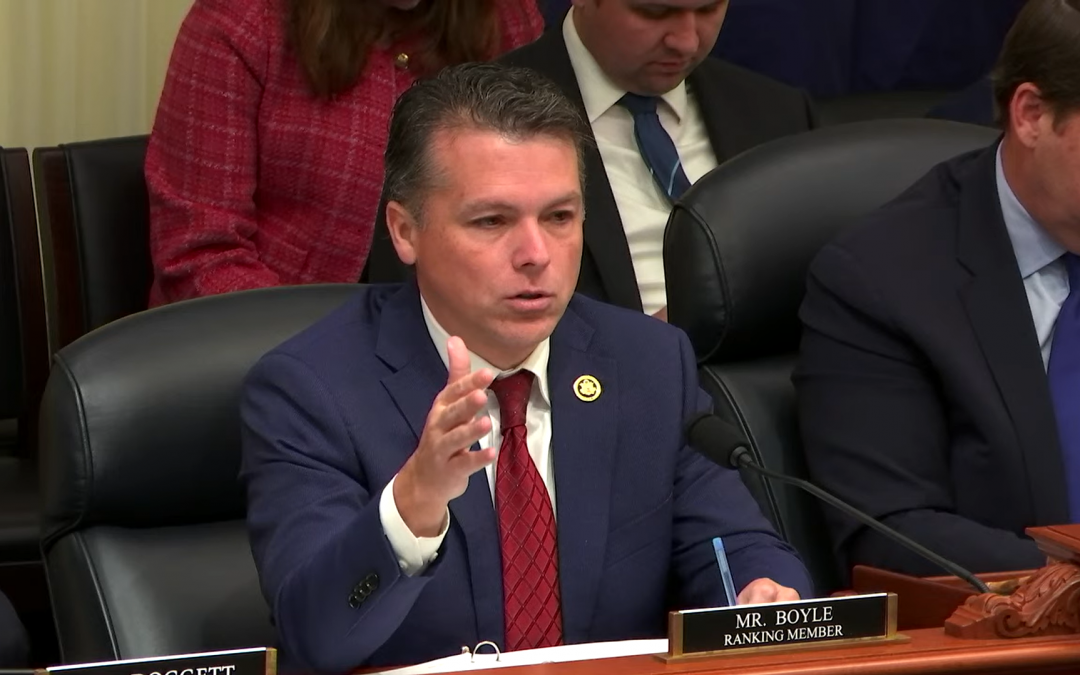
Lawmakers struggle to find consensus on health care reforms
While House Republicans and Democrats did not agree on paths to health care cost reforms, they found common ground on breaking up market consolidation.
read moreHouse Republicans, Democrats split on child care crisis solutions
WASHINGTON — House Republicans and Democrats disagreed Tuesday over how to address the nation’s ongoing child care crisis, as concerns mount following the Trump administration’s freezes on child care funding amid fraud investigations.
During a House Subcommittee on Early Childhood, Elementary, and Secondary Education hearing, Republicans emphasized tax credits and targeted grants to help employers provide child care. Democrats, however, contended that reliance on the private sector alone would be insufficient to meet the scale of the crisis and called for increased federal investment. The hearing followed a June 2025 session that highlighted bipartisan recognition of a growing child care crisis threatening families and the workforce.
Subcommittee chair Rep. Kevin Kiley, R-Calif., laid the groundwork for the hearing, emphasizing that federal programs are insufficient to cover the high costs of child care for millions of children. He called for “private-sector innovation” to provide care for employees.
“Employer engagement is a critical leg in the three-part support system holding up our child care market. Families, government and employers each play a role,” Kiley said.
The hearing featured testimony from three business owners working to provide child care benefits to employees, including Alex Grover, chief executive officer of i2M. The manufacturing company partnered with a local child care provider in 2022 to offer subsidized, extended-hours care for their employees.
Grover described an employee who enrolled his children in the company’s child care program, enabling his wife to enter the workforce and eventually join the i2M team.
“That is not social policy,” Grover said. “It is a clear example of capitalism working as it should, aligning incentives in a way that benefits families, businesses and the broader economy.”
Democrats, meanwhile, stressed that the weight of addressing the nation’s child care crisis should not fall on employers alone. The ranking member, Democrat Suzanne Bonamici, D-Ore., said employer-led solutions can help but that Congress must pursue a “comprehensive solution” to ensure access to affordable, high-quality child care.
Rep. Summer Lee, D-Pa., echoed that view, highlighting the discrepancy in Pennsylvania’s child care system. Child care workers earn less than $30,000 a year, yet child care for one child costs nearly $14,000 annually, reflecting what she called a “broken” system.
“For every employer represented at our hearing today, how many others don’t offer any child care or paid leave, when workers have to care for their sick children or other family members?” Lee said. “This is a very big country with diverse industries and different types of business leaders. If we’re sitting here and we’re waiting for everybody to be benevolent, we are going to be waiting forever. We can’t only look at employers and the private sector to fix a broken system that everybody is under.”
Rep. Mark Harris, R-N.C., however, argued that responsibility for addressing the child care crisis should rest primarily with state and local governments and the private sector. He asserted that the federal government cannot sustainably “spend or regulate its way out” of the issue.
“We’re seeing the consequences of that approach play out right before our eyes in Minnesota, where weak oversight has allowed child care subsidy programs to become magnets for waste, fraud and abuse,” Harris said.
Pushing back on Harris’s reference to fraud in Minnesota, Rep. Adelita Grijalva, D-Ariz., said the Trump administration’s attempt to freeze child care in five Democratic-led states over suspected fraud came “without concrete evidence” and lacked an independent investigation.
Amy Matsui, vice president for child care and income security at the National Women’s Law Center, expressed concern that the Trump administration’s “fast, unprecedented action” to freeze funds after “unsubstantiated allegations” opens the door for vigilantes to target child care providers.
After the hearing, Matsui stressed that Congress needs to repeat what it did during the pandemic, when both sides of the aisle agreed to fund child care.
“I hope that the evidence of robust investments during the pandemic helping providers keep their doors open and people go back to work shows what happens when you make investments in the child care sector,” Matsui told Medill News Service.
She observed that Republicans and Democrats now see very different solutions to the child care crisis.
“There seems to be disagreement about the impact of tax solutions compared to public investments,” Matsui said. “But if you look at the broken market that child care is without input from a third party investor, which is the government, the fundamental math problem is not gonna get solved.”
Washington Spirit fans channel activism pitchside with ‘Free DC’
WASHINGTON — As Gotham FC and the Washington Spirit sought to get on the board during the NWSL Championship on Nov. 22, both teams’ respective supporters’ groups faced one another from opposite sides of PayPal Park.
But when the clock hit 51:00, the stadium united in a minute-long chant that has become a tradition among Spirit fans: “Free D.C.,” the district’s rallying cry for statehood.
It was a scene reminiscent of the Spirit’s Audi Field in Washington, affectionately dubbed “Rowdy Audi.” Fans in Sections 136 and 137 — the stomping grounds of the Spirit Squadron, the team’s independent supporters’ group — have led “Free D.C” chants at every match since mid-August.
Unlike most other Squadron chants, “Free D.C.” isn’t a play on a song. It’s not listed as an official chant on the group’s website. It’s a political message that has gained strength as residents grapple with the deployment of the National Guard on their streets, which came to a head late November when two National Guardsmen were shot blocks away from the White House.
Support for D.C. home rule extends league-wide. Fans of other teams, including Gotham, initiated the chant in the 51st minute (beginning when the clock hits 51:00, in traditional soccer timing the 52nd minute) when their teams hosted the Spirit during the regular season.
Several players are also aware.
“We always know it’s coming in the 51st minute, and so we back our fans and are happy to support them in their fight,” Spirit captain and goalkeeper Aubrey Kingsbury said.
The Spirit ultimately lost the championship to Gotham 1-0 and now face a slew of roster uncertainties in the offseason. But although the season has ended, the chant isn’t going away.
During a match against Racing Louisville FC on Aug. 15, Squadron president Meredith Bartley thought up the chant and its timing to represent Washington, D.C., as the 51st state.
Bartley stands in front of the supporters’ section and conducts an orchestra of about 1,500 fans every match. With a megaphone in hand to initiate chants, she’s often among the loudest voices in Section 137.
Once she got “Free D.C.” going for the first time, she just stopped and listened.
“It was one of the loudest things I’ve ever heard,” Bartley said.
A Spirit representative said in a statement that every match is “a welcoming space for all to come be themselves and represent what they believe in and who they are.” Players like Kingsbury and Spirit defender Paige Metayer echoed that sentiment.
“We’re in the unique situation where we get to be a voice for our city,” Metayer said.
View this post on Instagram
‘Kindred spirits’
Calls for Washington home rule date back to the 1960s. The official Free D.C. project began in 2023 as a response to Congress overturning the district’s revised Criminal Code Act. In addition to rallying at events like the No Kings protest, thousands of volunteers participate in monthly ward meetings and frequent non-cooperation training.
During a league-wide July break, Free D.C. volunteers Shauna Gordon-McKeon and Slobodan Milic hatched the idea of starting the “Free Spirits,” a group of Spirit fans within Free D.C.
Milic, a Serbia native, said the Trump administration gave him “deja vu.” Before moving to Washington three years ago, he lived in the Middle East and in African countries, including Morocco, while working for the U.S.-based National Democratic Institute.
He said the elaborate chants he heard in Moroccan soccer stadiums touched on political topics that would get individuals arrested for mentioning.
“Soccer stadiums are the last refuge,” he said. “That’s where you go to hear the truth.”
When Bartley raised the idea of chanting “Free D.C.” before the Racing Louisville match in August, Milic thought only the supporters’ sections would participate. His wife, watching on television, later told him she could hear the words on the broadcast.
Squadron member Kris Ramos, who leads chants with Bartley, said he wasn’t surprised this particular chant “spread like wildfire” through the stadium. It was easy to learn, he said. And it let fans shout.
“People in the city right now just need a release, just need escapism as well as a space to feel seen,” Ramos said. “It’s easy to feel helpless with everything that’s going on.”
For season ticket holder Jessica Weliwitigoda, the words go beyond an ordinary chant.
“You can feel a collective feeling of empowerment,” she said. “Of being around kindred spirits.”
‘Larger than soccer’
Supporters’ groups across the country took notice of what unfolded in the 51st minute of the Washington-Louisville match.
One week into its existence, the “Free D.C.” chant could be heard at San Francisco’s Oracle Park during the Spirit’s match against Bay FC.
A few weeks after that, when the Spirit travelled to face the Kansas City Current, the supporters’ group KC Blue Crew was ready to yell the same two words.
And days before returning to face her former team in Washington on Sept. 28, Houston Dash defender Anna Heilferty posted a video on Instagram in support of Free D.C. After the Spirit’s win over the Dash, she and four Houston teammates put on Free D.C. shirts and posed for pictures in front of the Washington supporters’ section.
View this post on Instagram
The Virginia native said despite no longer living near Washington, she still feels connected to the community and issues that impact it. Fan support encourages her to speak up, too.
“One of the special things about NWSL fans is how they’re able to come together for these things,” Heilferty said in an interview.
The Spirit next played Gotham on the road Oct. 1. This time, it was Gotham supporters’ group Cloud 9 that initiated the chant in the 51st minute.
Fans who travelled from Orlando to Washington for the Spirit-Pride game on Oct. 18 were also happy to participate.
“There are some issues that are larger than soccer,” said Jay, a Pride supporter who wished to be identified by only their first name.
Other NWSL fans have pushed back against federal law enforcement in their own cities. Amid Immigration and Customs Enforcement (ICE) presence in Illinois, leaders from the Chicago Stars’ supporters’ group, Chicago Local 134, began fundraising for the Illinois Coalition for Immigration and Refugee Rights.
Although protests against federal law enforcement have only emerged in recent months, fans say activism itself has long been ingrained in the NWSL, which attracts fans with an affinity for activism.
“It means so much more than just liking the sport because there’s such a fight behind it,” said Jennifer Muller, a board member of Gotham supporters’ group Cloud 9.
NWSL commissioner Jessica Berman said she’s not surprised fans have embraced the “Free D.C.” chant.
“It’s clear, whether the fans are cheering for the Washington Spirit or anything else that they care about, that this community cares about this city,” Berman said. “They care about this team, and you can expect to see their enthusiasm about any issues that they think are important to their daily lives.”
The advocacy is not limited to fans. Members of Angel City FC donned shirts reading “Immigrant City Football Club” before a match in June amid ICE raids and protests in Los Angeles.
In Washington, the Spirit is the only professional sports team to have commented on federal activity in the city. The team posted a statement on Instagram captioned, “To D.C. with Love” the day after Trump announced the deployment of the National Guard.
“As your team, we stand with you,” the statement read. “As your neighbors, we walk beside you.”
View this post on Instagram
The Washington Wizards declined to comment. D.C. United, the Commanders, the Nationals, the Capitals and the Mystics did not respond to requests for comment.
‘The whole world is starting to notice’
After the chants’ initial success, Free D.C. volunteers printed 5,000 yellow cards to distribute to fans at the Dash game. Each card included instructions on the chant and a QR code that linked to the organization’s website.
Soccer referees show players yellow cards as warnings for unsportsmanlike conduct or fouls. Milic said Free D.C.’s cards represent the same message: a warning to the Trump administration.
The cards ran out two home games later.
On Nov. 8, in the playoff quarterfinals, the Spirit once again hosted Racing Louisville. Free D.C. volunteers came prepared with 10,000 yellow cards. Just after halftime, Milic said they’d given out 8,000 of them.
“You go to a soccer game, especially the Washington Spirit, and it’s all us,” he said. “Us weirdos, us marginalized, but also us, a little bit revolutionary.”
Fans traded their handheld yellow placards for larger posters that resembled brick walls in support of Kingsbury at the semifinal against Portland on Nov. 15. Still, several red and white “Free D.C.” flags hung amid the sea of yellow.
And during the Spirit’s championship bid, the chants rang out loud and clear on broadcast.
“From the first whistle at Audi Field to the very last second in San Jose, you built something rare and beautiful,” Spirit owner Michele Kang said in an Instagram post after the final. “You are the loudest, proudest, most devoted family in all of women’s soccer — and the whole world is starting to notice.”
View this post on Instagram
Latest Business
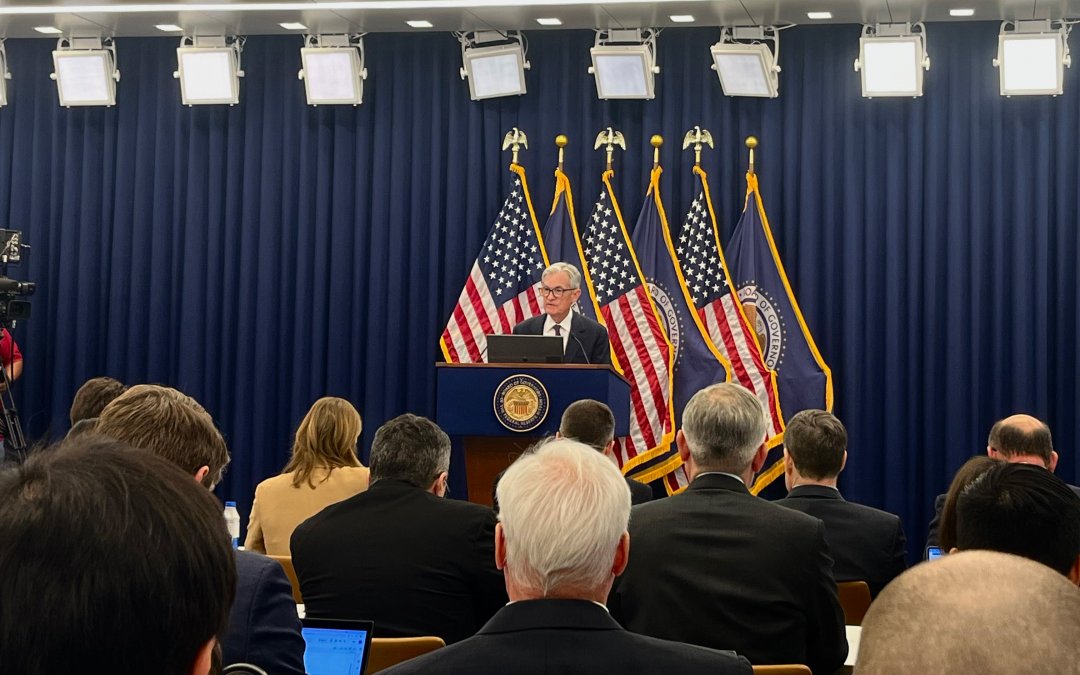
Fed Chair Jerome Powell deflects political questions as interest rates remain unchanged
In a press conference on Wednesday, Federal Reserve Chairman Jerome Powell refused to directly answer political questions but defended his appearance at the Supreme Court’s trial on Lisa Cook and the FOMC’s decision to keep the federal funds rate the same.
read moreRepubs, Dems support lowering housing costs, divided on policy reform
WASHINGTON – House Oversight and Government Reform subcommittee Chairman Eric Burlison, R-Miss., blamed rising home prices on a supply issue, which he claimed is caused entirely by government policy during a hearing on Thursday.
“That is not a failure of the free market,” he said. “That is a failure of the government.”
Both parties in Congress have remained united on lowering housing costs for months. The House Committee on Financial Services advanced the bipartisan Housing for the 21st Century Act on Dec. 17, which, if passed, would increase home development and construction. The housing package is awaiting consideration from the full House.
In July, the Senate Banking Committee advanced the bipartisan Renewing Opportunity in the American Dream (ROAD) to Housing Act of 2025, although it was cut from the final 2026 National Defense Authorization Act passed by Congress.
Patrice Onwuka, director of the Center for Economic Opportunity at the Independent Women’s Forum, told the subcommittee that housing affordability is rooted in supply shortage. To address the problem, she recommended relaxing tax policies to encourage multigenerational living and at-home caregiving, as well as deregulating appliance requirements and building mandates for new housing.
“There is so much agreement, so much bipartisan consensus, that now is the time for deregulation and housing that would increase housing supply,” she said.
Yet, despite agreement among representatives that supply must go up to bring costs down, Rep. Clay Higgins, R-La., said that when he was a first-time homebuyer, he would not have wanted the government to interfere with the free market.
“What we want is the federal government [to get] the hell out of our way so we can live our lives,” he said.
Rep. Yassamin Ansaria, D-Ariz., questioned witnesses about the economic impact of President Donald Trump’s deportations on the construction industry. She said that mass deportations have resulted in fewer workers, which has driven up supply-side costs.
Ansari hosted a shadow hearing on housing affordability on Jan. 14, which Rep. Maxwell Frost, D-Fla., also attended. He said that during his rounds of door-knocking in Florida, housing came up repeatedly as the most pressing issue for his constituents.
A Politico poll from December reflected a similar sentiment, finding that respondents found housing to be one of “the most challenging” expenses to afford, second only to groceries.
In his concluding statement today, Frost said Congress is united on bringing down home prices, but the federal government should not interfere with housing regulations, adding that Democrats are trying to figure out what “bipartisan support looks like in Congress to push forth the Democratic proposal that’s been endorsed by President Trump.”
He referenced a press release from the White House on Tuesday, where the Trump administration announced that Wall Street investors would no longer be able to crowd out the middle class by buying single-family homes.
Frost also said investors are damaging the market by outbidding new homebuyers and purchasing foreclosures.
“Whether it’s 2008 or COVID-19 or the next event, we can count on people in Wall Street to exploit Americans’ housing affordability crisis,” he said.
HUD secretary testifies as House reps press on housing affordability, oversight
WASHINGTON — Lawmakers pressed Housing and Urban Development Secretary Scott Turner on oversight of federal housing programs and the Federal Housing Administration during a House Financial Services Committee hearing on Wednesday, as housing affordability remains a persistent challenge nationwide.
The hearing comes as U.S. consumers continue to navigate a costly housing market. While mortgage rates have fallen to about 6.06%, down from more than 7% a year ago, affordability remains strained. ATTOM data shows that in 99% of U.S. counties, median-priced homes are less affordable than historical averages.
Lawmakers pointed to housing supply constraints as a key factor behind those trends.
“As you are likely aware, the average first-time homebuyer in the United States is now 40 years old,” said Rep. Ann Wagner, R-Mo. “Clearly, housing supply is not keeping up with demand.”
HUD oversees roughly 100 major housing, mortgage and assistance programs and received more than $89 billion in discretionary funding in fiscal year 2025. Four programs — tenant-based rental assistance, project-based rental assistance, the Public Housing Fund and Homeless Assistance Grants — account for about three-quarters of the agency’s annual budget.
Much of the hearing focused on concerns that some long-standing HUD programs have not been meaningfully reviewed recently, raising questions about whether they are being effectively overseen and evaluated by Congress.
Rep. Ayanna Pressley, D-Mass., criticized the department’s responsiveness to congressional oversight, calling it “unfortunate, unacceptable and deeply disappointing” that it took more than a year for the secretary to appear before the committee.
Concerns over federal housing assistance were also raised through personal testimony. Rep. Brittany Pettersen, D-Colo., cited her mother’s experience relying on federally funded housing programs to highlight the stakes for vulnerable populations, including people struggling with addiction and housing instability.
Turner emphasized the department’s focus on accountability, pointing to oversight mechanisms aimed at improving safety in public housing and ensuring basic protections for residents.
The hearing also examined the financial health of the Federal Housing Administration, which insures mortgages primarily for first-time, low- and moderate-income buyers. HUD reported that the FHA’s mortgage insurance fund held a capital ratio of 11.47% in 2025, well above the statutory minimum.
Even with recent declines in interest rates, housing costs remain high for many households. According to a recent analysis by Zillow, typical monthly mortgage payments now consume more than 30% of median household income nationally, exceeding the threshold commonly used to define housing cost burden.
The hearing unfolded as housing policy continues to draw attention beyond Capitol Hill. Speaking at the World Economic Forum in Davos, Switzerland, on Jan. 20, President Donald Trump reiterated proposals aimed at boosting homeownership, including restricting large institutional investors from purchasing single-family homes and directing federal agencies to buy mortgage-backed securities to help lower borrowing costs.
One of the most contentious exchanges during the hearing centered on disaster recovery funding. Rep. Brad Sherman, D-Calif., questioned HUD’s handling of Community Development Block Grant Disaster Recovery funds following recent wildfires in Los Angeles, noting no assistance was directed to affected communities.
“You’re saying people in my district should be shafted because you don’t like our politicians?” Sherman said.
Turner responded that responsibility for disaster recovery efforts rests with state leadership, a reply that drew further criticism from several Democratic members.
Still, Turner sought to frame housing as a nonpartisan issue.
“Housing to me is not political. Housing affects the 340 million people in our country,” Turner said, adding that the department is working to modernize programs while maintaining access to affordable housing and protecting taxpayer funds.
SOTU: Health Care
WASHINGTON – President Donald Trump said Tuesday that Congress should approve his plan to replace Obamacare with a new health care program that would provide “affordable alternative” insurance options and criticized Democrats for trying to impose “a socialist takeover of our health care system.”
“A good life for American families requires the most affordable, innovative and high-quality health care system on earth,” Trump said in his third State of the Union address.
Trump said he has proposed health care plans that would be up to 60% cheaper than the Affordable Care Act plans. Both the White House and the Department of Health and Human Services did not respond when asked if a specific replacement plan has existed or ever will.
The president blamed Democrats for not providing the American people with the health care reforms he has promised.
“As we work to improve Americans’ health care, there are those who want to take away your health care, take away your doctor, and abolish private insurance entirely,” said Trump, referring to the Democrats.
Democrats stood up at this comment, pointed their fingers at Trump and shouted “YOU.”
Trump said 130 Democrats endorse legislation to impose a “socialist takeover” of the health care system by “taking away the private health insurance plans of 180 million.”
Democratic presidential candidates Sen. Bernie Sanders, I-Vt., and Sen. Elizabeth Warren, D-Mass., are pushing for a “Medicare for All” plan that would end private health insurance while other candidates like former Vice President Joe Biden, Pete Buttigieg and Sen. Amy Klobuchar, D-Minn., are pushing to expand on Obamacare.
“We will never let socialism destroy American health care,” Trump said.
Trump emphasized the administration’s efforts to protect patients with pre-existing conditions, to which Democrats threw up their hands and shook their heads in disagreement. Led by House Speaker Rep. Nancy Pelosi, D-Calif., Senate and House Democrats brought more than 80 patients, doctors and health care advocates from across the country as guests to the speech.
“President Trump will speak to an audience filled with Americans who are suffering because of his broken promises on prescription drug costs and his all-out assault on Americans with preexisting conditions,” Pelosi said in a press release Tuesday morning.
The president also called upon Congress to pass legislation to lower prescription drug prices.
“Get a bill to my desk, and I will sign it into law without delay,” the president said.
Democrats responded to this by booing and holding up three fingers to represent H.R. 3, legislation proposed by the late Rep. Elijah E. Cummings that would require the Centers for Medicare and Medicaid Services to negotiate certain drug prices. The bill has been on Senate Majority Leader Mitch McConnell’s desk for over a month after being passed in the House.
Generic prescription drug prices dropped 1% in 2018, the first price drop in 45 years, according to the Department of Health and Human Services. Trump said it was the first time in 51 years. Brand-name drug prices, however, are still increasing.
Trump said the administration will continue to make health care more transparent by requiring hospitals to make their prices negotiated with insurers public and easily accessible online. He also pointed to the passage of administration-backed legislation called “Right to Try,” which allows terminally ill patients access to drugs not fully approved by the Food and Drug Administration if they feel they have tried all other options.
He also said he has launched new initiatives to improve care for Americans with kidney disease, Alzheimer’s and those struggling with mental health challenges, in addition to pursuing new cures for childhood cancer and AIDS.
The House Ways and Means Committee will hold a hearing Wednesday afternoon to further discuss Trump’s health care policies and overcoming pharmaceutical barriers in particular.
Trump Sticks By Wall in State of the Union Address
WASHINGTON – President Donald Trump’s call for a wall to secure America’s southern border in his State of the Union address Tuesday night was no surprise to opponents.
Jennifer Johnson, the policy director at the Southern Border Communities Coalition, said Trump continually characterizes the southern border as a violent area.
“More of a reality check, these are families and children seeking protection, fleeing spiraling violence and poverty,” she said.
Chris Montoya, who served as a Customs and Border Protection agent for 21 years, said that “crime rates are pretty low in border cities. Being a border patrol agent is one of the safest law enforcement jobs. All those things together means a safe border.”
Rep. Adriano Espaillat, D-N.Y., invited as his guest a mother who had been separated from her children at the border.
Other Democrats brought undocumented immigrants as their guests, including Sen. Jeff Merkley, D-Ore., Rep. Jimmy Gomez, D-Calif., and Rep. Bonnie Watson Coleman, D-N.J.
Rep. Sheila Jackson, D-Texas, was enthusiastic about their attendance at the address. “Their presence here today is representative of the big tent that America is,” she said.
In his address, Trump attributed what he called at crisis at the border to America’s “reduced jobs, lower wages, overburdened schools, and hospitals that are so crowded you can’t get in.” He referenced San Diego and El Paso as being cities that were once violent, and now safe with the addition of physical barriers.
Trump also mentioned the prevalence of MS-13 within the country. “They almost all come through our Southern border,” he said.
Montoya said MS-13 members do enter through the southern border on rare occasions, but it is uncommon for CBP agents to make an arrest.
Senate Minority Whip Dick Durbin is the ranking member on the Senate Subcommittee for Border Security and Immigration. He said nothing changed in Trump’s rhetoric. “If we’re waiting on him, we’re not going to get this solved,” he said.
Washingtonians alternately protest, celebrate the State of the Union
WASHINGTON – DC-area residents had very different reactions to President Donald Trump’s second State of the Union address Tuesday night. But whether they celebrated or denounced the event, emotions were strong.
Around 40-50 people gathered at each of two intersections near the Capitol ahead of the address — far fewer than the 400 people who protested last year, according to Resist DC, the community action group that organized both years’ protests.
People lined the sidewalks along the streets that President Donald Trump, Vice President Mike Pence and other Trump cabinet members’ motorcades were expected pass by. They held homemade signs lit with string lights so they would be visible to government officials in their cars and chanted anti-Trump messages to music and drums.
Eileen Minarick, 70, said she was protesting simply “because the state of our union is terrible.”
Elsewhere in the city, local bar patrons gathered to drink beer, compete in presidential bingo and watch the State of the Union.
Grassroots activist group CODEPINK hosted a number of guest speakers, including actor Danny Glover, for a lively discussion before the main event. Topics ranged from the Bolivarian revolution to ending domestic violence.
Anita Jenkins, spokeswoman for Stand Up for Democracy, riled the crowd with a call to establish the District of Columbia the 51st state in the United States.
“The people of D.C. have no representation… We have nobody to speak for us,” she said. Modifying the words of America’s early founders, she said, “Taxation without representation is a rip-off.”
As President Trump appeared on the projector, shouts of disapproval rose from the bar patrons. The State of the Union 2019 had begun and the energy was energetic in its moroseness.
Across town, the atmosphere was also charged. Members of DC Young Republicans and Arlington Falls Church Young Republicans filled a restaurant for a celebratory viewing party.
“In the past, most of the people in this room voted for a wall… but the proper wall never got built,” said Donald Trump. He paused and then said, “I’ll get it built.” Hoots and hollers erupted in the bar and two girls were seen smiling and hugging each other.
Though Trump stressed unity in his national address, DC-area residents remained divided in their reactions.
2020 Candidates Alternate Cheers, Hisses to Trump Wall, Immigration Proposals during State of Union
WASHINGTON – Several Democratic 2020 presidential candidates expressed their displeasure with many of President Donald Trump’s policies during the State of the Union address Tuesday.
Sens. Kamala Harris, D-Calif., and Elizabeth Warren, D-Mass., could be seen shaking their heads when Trump mentioned controversial topics such as his commitment to building a border wall and the dangers of migrant caravans heading to the U.S. southern border.
Harris, who announced her candidacy on Jan. 21, shook her head and visibly mouthed, “They’re not,” as Trump said, “Large, organized caravans are on the march to the United States.”
In a Facebook Live address before the State of the Union, Harris told viewers, “It’s a moment for a president to rise above politics and unite the country with a vision that includes all Americans, not just the ones who may have voted for them. It’s a moment to bring us together.”
Early in the address, Harris was often reluctant to give Trump a standing ovation, asking her colleagues, “Really?” as they cheered the president’s comments about space exploration.
The candidates and their Democratic colleagues booed and hissed as Trump labeled the numerous investigations into his campaign finance and relationship with Russia “ridiculous partisan investigations.”
“If there is going to be peace and legislation, there cannot be war and investigation,” he said. “It just doesn’t work that way!”
Democrats cheered later as Trump mentioned that women have filled 58 percent of new jobs in the past year. New York Sen. Kirsten Gillibrand, who has formed a presidential exploratory committee, pointed at the newly elected House Democrats, who stood up and chanted, “USA, USA.”
“I think he didn’t realize that all the female jobs he created were for [congresswomen],” Gillibrand said after the speech.
The Democratic candidates stood and applauded with everyone in the chamber when Trump recognized World War II veterans, a SWAT team member and a childhood cancer survivor.
Sen. Bernie Sanders, I-Vt., sat stoically as Trump denounced socialism. Sanders, who calls himself a democratic socialist, is widely considered likely e to enter the presidential race. Unlike Sanders, Gillibrand and Harris stood and applauded as Trump said, “America will never be a socialist country.”
TRUMP STRIKES CHORD WITH WOMEN, FALLS FLAT ON BIPARTISAN BORDER WALL PITCH
WASHINGTON — President Donald Trump got one of his biggest rounds of applause during his State of the Union address Tuesday night when he noted that Congress now has a record-high number of elected women, but it wasn’t lost on the crowd that when the women rose to cheer they were mostly on the Democratic side of the aisle.
“Americans can be proud that we have more women in the workforce than ever before,” Trump said as the women lawmakers rose to clap and celebrate. He then advised them “Don’t sit. You’re going to like this.”
“Exactly one century after the Congress passed the constitutional amendment giving women the right to vote, we also have more women serving in the Congress than at any time before,” he said. There were 117 women elected to Congress in 2018.
Bipartisan chants of “USA! USA!” filled the chamber as both the Democrats and Republicans broke into uproarious applause. Many of the Democratic women wore white and donned pins that read “ERA YES,” in a nod to the women of the suffragette movement.
Trump called his list of priorities “the agenda of the American people” in his second State of the Union address Tuesday, which was delayed a week because of the 35-day government shutdown, which didn’t end until the previous Friday. The address was the first the president has delivered before the new Democratic majority in the House.
The president remained on-script for the duration of the 84-minute speech and touted his administration’s achievements from the past two years. He also laid out several legislative priorities going forward, including a “smart, strategic, see-through steel barrier,” an infrastructure bill and the eradication of HIV and AIDS.
Rep. French Hill, R-Ark., was glad that health care was a topic in the speech, while Sen. John Barrasso, R-Wyo., described the speech as “terrific.”
“We haven’t gotten that right when it comes to protection our citizens with pre-existing conditions, correcting all the problems and costs associated with the ACA,” French said. “I like that he kept an emphasis on that while also tackling the prescription drug process.”
For Sen. Tom Carper, D-Del., laying out these broad initiatives wasn’t enough.
“I wrote down a number of initiatives — defense spending, cancer research, transportation, infrastructure — and never heard anything of how we’re going to pay for them,” he said.
The president also pushed his plan to withdraw U.S. troops from Syria and to reduce drastically the number of troops in Afghanistan.
Among Democrats, reactions were mixed as Trump highlighted his achievements. When Trump lauded the U.S. increase in gas and oil production, Rep. Alexandria Ocasio-Cortez, D-N.Y., who has championed a Green New Deal to address accelerating climate change, remained seated.
Many Democrats applauded Trump’s push for a new infrastructure bill and decision to withdraw troops from Syria and Afghanistan.
House Speaker Nancy Pelosi, who sat behind Trump with Vice President Mike Pence, was clearly following a printed version of the speech. She applauded when Trump mentioned criminal justice reform and bipartisan efforts on lowering drug costs and furthering women’s rights.
After praising a recent bipartisan effort to secure criminal justice reform, Trump shifted to a project he said would require the same bipartisan effort: a southern border wall.
“Simply put, walls work and walls save lives,” he said. “So let’s work together, compromise and reach a deal that will truly make America safe.”
However, Rep. Pramila Jayapal, co-chair of the Congressional Progressive Caucus, was not encouraged by the president’s attempt to strike a bipartisan tone.
“I just don’t think he is to be trusted,” she said. “This is not a president who is working for the middle class of this country.”
Rep. Eliot Engel, D-N.Y., said that while parts of Trump’s speech were good, he was too combative at times.
“There should have been more emphasis on the fact that the government was shut down and we all need to work together to bring it back,” he said. “Blaming the Democrats is not going to keep the government open.”
Freshmen members of Congress excited, disappointed at their first State of the Union address
WASHINGTON — Before attending his first State of the Union address, Rep. Jefferson Van Drew, D-N.J., felt a sense of excitement and joy, but also feared the president might once again fan partisan flames by rehashing controversial issues.
“I hope that right now, he doesn’t talk about closing the government again. I hope he doesn’t talk right now about declaring a national emergency. I would so much rather see that we try to work together and get something done. That requires flexibility on Democrats side as well. Both sides have to do this,” said Van Drew.
Partisanship is the reason the approval rating for Congress is so low, but issues like border security, and infrastructure deserve cooperation between the two parties, said Van Drew.
“Rather than just argue and disagree and investigative and be hurtful on both sides, maybe we can actually get something get done.”
▬▬▬▬▬▬▬▬▬▬▬▬▬▬▬▬▬▬▬▬▬▬▬▬▬▬▬▬▬▬▬▬▬▬▬▬▬▬▬▬▬▬▬▬▬▬▬▬▬▬▬▬
Although having been full-fledged members of Congress for a little over a month, the freshmen class of senators and representatives still retains a “sense of awe” about the State of the Union address, said Rep. Chris Pappas, D-N.H. Pappas said he hoped Trump would strike a conciliatory tone with Democrats, allowing lawmakers to avoid a second government shutdown.
Pappas brought a transgender military veteran from his home state to hear the president as a symbol of his hope that Trump’s transgender military service ban will be lifted.
“That doesn’t make us any safer and in fact plays politics with the military,” he said.
In addition to passing social justice reform, Pappas said he would like Trump to speak about the opioid crisis, prescription drug costs and infrastructure — and Trump did.
▬▬▬▬▬▬▬▬▬▬▬▬▬▬▬▬▬▬▬▬▬▬▬▬▬▬▬▬▬▬▬▬▬▬▬▬▬▬▬▬▬▬▬▬▬▬▬▬▬▬▬▬
In Illinois Rep. Sean Casten’s dreams, Trump’s State of the Union address would make climate change a priority, but said his expectations were low. Trump did not in fact mention the environment.
“Truth is what I hope he doesn’t say is what I fear he will say,” Casten said, “which is that he’s going to threaten to shut down the government again if he doesn’t get a wall.”
Casten’s guest was Julie Caribeaux, the executive director of Family Shelter Service, which receives federal aid and provides support for victims of domestic abuse. He said domestic violence victims are some of the “primary victims” of Trump’s rhetoric.
▬▬▬▬▬▬▬▬▬▬▬▬▬▬▬▬▬▬▬▬▬▬▬▬▬▬▬▬▬▬▬▬▬▬▬▬▬▬▬▬▬▬▬▬▬▬▬▬▬▬▬▬
Rep. Anthony Brindisi, D-NY, was hoping for a message of bipartisanship and unity, things that “the American people are calling for.” Trump did call on Congress to act together on many issues.
Brindisi’s top priorities this year are trying to find common ground with the Republicans on immigration reform, infrastructure and lowering prescription drug costs. On infrastructure, he said he specifically wanted to hear Trump’s ideas on investing in job training programs. Trump mentioned all the issues, but with little specificity except that he wants a border wall and enforcement to stop what he called “caravans of migrants” heading to the southern border.
“Those are things that I talked about during the campaign that many people back in upstate New York are calling for and those are things I hope he does say,” Brindisi said.
▬▬▬▬▬▬▬▬▬▬▬▬▬▬▬▬▬▬▬▬▬▬▬▬▬▬▬▬▬▬▬▬▬▬▬▬▬▬▬▬▬▬▬▬▬▬▬▬▬▬▬▬
Rep. Susie Lee, D-Nev., said she gets excited every time she walks onto the House floor, and Tuesday was no exception. Although there were parts of the speech she did not agree with, namely Trump’s insistence on a border wall, Lee said she appreciated the call for bipartisanship.
Lowering prescription drug prices, investing in infrastructure and a comprehensive border control strategy — these are all components of his speech Lee said she could agree with.
“These are all ideas I can get behind and they work together to produce some results for American families,” she said.
▬▬▬▬▬▬▬▬▬▬▬▬▬▬▬▬▬▬▬▬▬▬▬▬▬▬▬▬▬▬▬▬▬▬▬▬▬▬▬▬▬▬▬▬▬▬▬▬▬▬▬▬
Rep. Deb Haaland, D-N.M., said she was dismayed about Trump’s urgency regarding funding for a border wall.
“I wasn’t surprised. Let’s put it that way about the president’s speech. I mean, of course, we don’t want a wall,” said Halland. “He instilled fear and everybody about the danger, you know, the danger that’s coming across the border.”
Haaland hopes to focus on promoting awareness about climate change and wished the President would be more receptive to the diverse issues and people around the country.
▬▬▬▬▬▬▬▬▬▬▬▬▬▬▬▬▬▬▬▬▬▬▬▬▬▬▬▬▬▬▬▬▬▬▬▬▬▬▬▬▬▬▬▬▬▬▬▬▬▬▬▬
Rep. Chuy Garcia, D-Ill., said he enjoyed his first State of the Union in a historical sense, but wanted President Trump to address issues he feels are important, including raising the minimum wage and healthcare.
He said while the president did mention lowering prescription drug costs, there was another area of healthcare that was not noted, such as the millions who do not have healthcare at all.
“He wrapped himself around a lot of patriotism and recognition of your courageous battles and victories and but in the end, I think he failed to address important things more,” Garcia said.
Post-SOTU Interviews with Illinois Democratic Reps. Jan Schakowski and Cheri Bustos
Our Alex Lederman sat down with Illinois Democratic Reps. Jan Schakowski and Cheri Bustos after the State of the Union to hear their thoughts on President Obama’s address.
Schakowski — Evanston’s congresswoman since 1999 — said “(Obama)’s vision of what makes our country strong was so human and so true.”
Bustos said Obama is focused on the future — our children and grandchildren — and working together to solve the nation’s problems.
Medill’s State of the Union night on social media
Medill on the Hill produces live State of the Union broadcast
WASHINGTON — It was the third day of reporting for the 21 students in Medill on the Hill. It also happened to be the day the president would deliver his final State of the Union address.
Months ago, buoyed by the excitement of the possibilities and the folly of youth, some of us came up with the idea of taking Medill on the Hill to a new level — producing live TV while also finding new ways of storytelling for the website and social media.
On State of the Union night, Jan. 12, the Washington web team led by Alex Duner and Celena Chong managed the flow of copy and constant web updates streaming in from reporters around Capitol Hill and elsewhere in D.C. There also was a constant stream of @medillonthehill tweets and snapchats as well as several Periscopes.
Tyler Kendall, Allyson Chiu and Shane McKeon were responsible for the main story, and Chiu said the experience was, “the highlight” of her journalism career.
“It was hectic, crazy and we were definitely all running on adrenaline by the end of the night,” she said.
Other reporters were assigned to stories on specific issues the president mentioned, or how local college students reacted to the speech. One even tweeted the speech in Spanish.
My task was to produce the Washington end of a live television broadcast.
Nine months ago Jesse Kirsch came back from 2015 Medill on the Hill with an idea for Carlin McCarthy, another producer with the Northwestern News Network, and me.
He said, with the optimism of a television anchor, that for the 2016 State of the Union we should produce a live broadcast with analysts at our home studio in Evanston and reporters in our D.C. bureau and on Capitol Hill. I said, with the skepticism of a television producer, that I thought he was crazy.
It took long nights, patience and a lot of support from the Medill faculty and staff, but we pulled it off.
Jesse opened the show in Evanston and before we knew it Isabella Gutierrez was doing a live hit from the Washington bureau. Then we were live in Statuary Hall with Noah Fromson, followed by a live report from graduate student Ryan Holmes on what to watch for just minutes before we streamed the live feed of President Barack Obama addressing a joint session of Congress for his final State of the Union.
We did a live interviews with Senate Democratic Whip Dick Durbin, wrote scripts while we counted down the seconds until they were read and gathered quotes from senators and members of Congress. Alex Lederman also provided quick-turn video interviews with two congresswomen.
Associate Producer Geordan Tilley, who interviewed Durbin, was nervous before the show, but she said she is proud of the Medill effort.
“I thought the show was some of our best work, Tilley said. “Especially considering how many firsts were involved, not the least of which was our first time going live.”




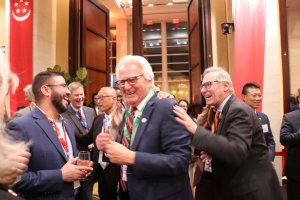


























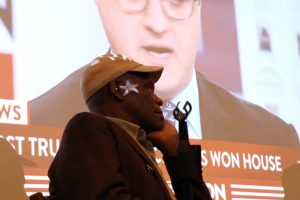



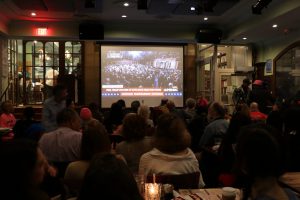












Wildfire bill sparks partisan clash at House hearing
by David Sun | February 3, 2026 | Environment, Featured | 0 Comments
Debate over the Fix Our Forests Act featured limited discussion of the bill itself as Democrats focused on broader criticisms of the Trump administration.
Experts warn window to weaken Hezbollah is closing
by Anisha Iqbal | February 3, 2026 | Featured, National Security | 0 Comments
Lawmakers and security experts said that Hezbollah remains capable of quietly rebuilding power in Lebanon unless the U.S. helps with economic reform and disarmament efforts.
In Photos: ‘ICE Out For Good’ protesters gather in freezing temperatures
by Cayla Labgold-Carroll | February 3, 2026 | Featured, Politics, Topics | 0 Comments
Protesters gathered at the intersection of Georgia Ave-Petworth to speak out against ICE activity in the U.S.
In Photos: From Dancing to a Free Round Trip, US Mayors Deepen Ties With Singapore and each other
by Dasha Dubinina | February 3, 2026 | Featured, Politics, Topics | 0 Comments
The U.S. Conference of Mayors held an event at the Singaporean embassy on Thursday night where mayors mingled, viewed exhibits and ate traditional food.
In Photos: Workers lead D.C. vigil mourning Pretti, rally against ICE violence
by Gloria Ngwa | January 29, 2026 | Featured, Immigration | 0 Comments
Vigil attendees called for an end to aggressive ICE while mourning Alex Pretti.